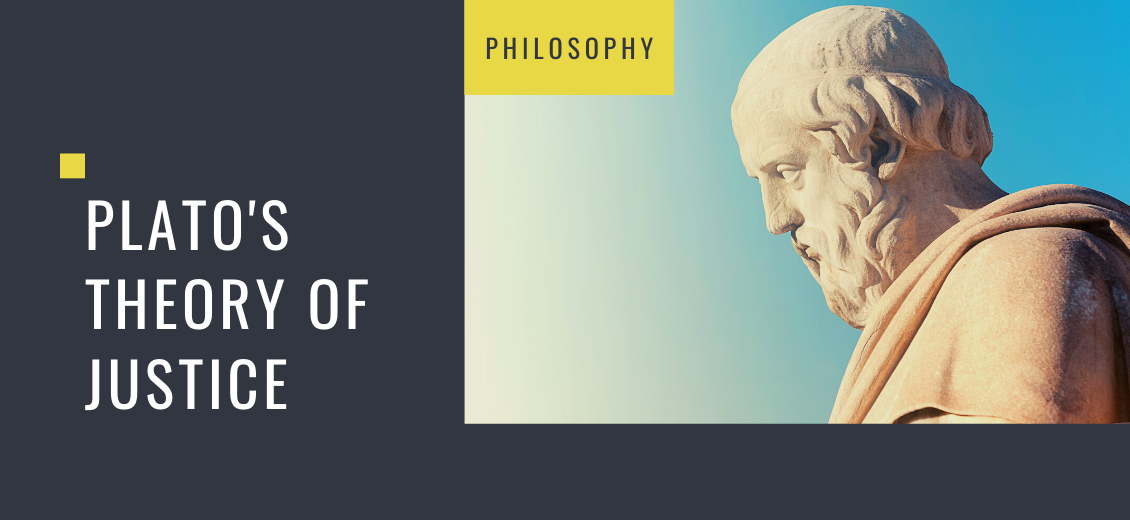Plato’s Theory of Justice
Blogs Home
- 19 Oct 2021

Introduction
The question of justice has been central to every society, and in every age, it surrounds itself with debate. Justice has been the most critical part of a person's morality since time immemorial. Perhaps, it is for this reason that Plato, the ancient Greek philosopher, considered it crucial to reach a theory of justice.
Finding out the principles of justice is the main concern in Plato's Republic, to the extent that it is also subtitled as ‘Concerning Justice’.
Ethics and Justice
In the Greek tradition of philosophy, political science was formulated after ethics. Ethics is referred to as a branch of learning that associates itself with good conduct. Ethics is, thus, that branch of philosophy that studies morality and deals with the questions of right and wrong.
The Greeks have considered ethics to be the foundations of Politics and Justice. According to Greek philosophy, the state comes into existence for the sake of life and continues for the sake of a good life, which makes it essential to have a "just society and a just state."
Plato, who can also be called the pioneer of Western Political Thought, viewed justice as a central question when dealing with politics (here, politics denote the subject of political science).
Plato and his thoughts
Greek political thought originates from Socrates. Plato was one of the most brilliant disciples of Socrates. Plato is considered the pioneer of Western Political thought today. It is because his mentor, Socrates, did not produce any writing, and we know of his thoughts only from the writings of Plato.
Plato, whose original name is Aristocles, was interested in pursuing philosophy and searching for the "truth". After the tragic death of Socrates, Plato produced various works on questions of State, Law, Justice, Politics and Philosophy. The Republic, in particular, is one of his most famous works. It deals with a wide range of ideas, and many of those ideas are relevant and are studied to date. Theory of Justice in Plato's Republic is worth studying for any political science student today.
Plato's Theory of Justice
Since the tradition of Greek Philosophy considered ethics to be important, they believed that the state comes into existence for the sake of life and continues for the sake of a good life. Plato believed in the same dictum and held that the state exists to fulfil the necessities of human life. The origin of the state, therefore, owed its existence to the fulfilment of human needs, and the Greek philosophers saw society and state as the same.
Unlike other living beings, human beings do not merely seek survival but essentially want to live a good life. Justice is the essential requirement to lead a good life. One cannot lead a good life without meeting their needs, and it's possible to meet one's needs only in the presence of Justice.
The Republic discusses Justice in the form of a dialogue. This methodology is known as Dialectical Method, which Plato borrowed from his mentor, Socrates. The dialogue takes place between Socrates, Glaucon, Adeimantus, Cephalus and Thrasymachus. The dialogue concluded that if one were allowed to suppress another, there would be complete anarchy, and it would be difficult to have any state of affairs. To save oneself from any such suffering and to prevent injustice, men enter into a contract to prevent injustice upon themselves or on others. That is also how laws came into existence to codify standard human conduct and bring a sense of Justice.
Essence of Justice
Socrates clarifies that justice is a relationship. A relationship among individuals relies on the kind of social organisation they inhabit. He further explains that justice can be analysed on a large scale, that is, state and then, on the level of the individual. Therefore, Plato's idea of justice believes that just individuals and just society are interwoven. To further understand Plato's theory of justice and its essence, it is important first to solve the issue of selecting the best ruler for the state. According to his argument, statesmanship is a special function and can only be performed by qualified persons with a moral character.
Then, in order to comprehend the nature of the state, the nature of man has to be understood too. Plato believed in "Like Man, Like State", implying that the character of the state is dependent on the character of its citizens. It also meant that once the nature of human beings is understood, it's easier to understand the functions of human society, and to arrive at the conclusion as to who is the best fit for ruling in this society.
Plato characterises human behaviour in three main sources:
- Desire (or Appetite)
- Emotion (or Spirit)
- Knowledge (or Intellect)
Each human being has all three emotions but what varies is the degree to which these emotions are present in them. According to Plato, the ones who are restless and rapacious are fit for trade. Others who are driven by their emotion or spirit are best suited to become soldiers. Lastly, there are few who find no pleasure in worldly pursuits or victory and are satisfied in mediation. Such beings yearn to learn, and they are always in search of truth, and according to Plato, only these men of wisdom are fit to rule.
Plato thinks that just like the perfect individual is the one who has the ideal combination of desire, emotion and knowledge, a just state is the one that has individuals as its citizens for trade, to be soldiers and to rule. In the perfect state, individuals driven by desire will lead to growth and production but would not rule; the military armies would maintain security but not rule either. Only the individuals who have no appetite to gain material possession or power and are forces of knowledge would become the rulers.
Justice: the virtue of state
In his idea of justice, Plato identifies virtues that suit each social class.
- The social class of traders, whose dominant trait is desire, the befitting virtue of traders is TEMPERANCE.
- The social class of soldiers, whose dominant trait is spirit or emotion, the befitting virtue of soldiers is COURAGE.
- The social class of Philosophers, whose dominant trait is knowledge or intellect, the befitting virtue of Philosophers, is WISDOM.
- The virtue that befits the state is JUSTICE which creates harmony in all the three social classes and is a necessary condition for human happiness.
The first three virtues belong to the respective three social classes, but the fourth virtue is a manifestation of harmony between all the three classes. These four virtues are also referred to as the four Cardinal Virtues of Plato's theory of Justice.
Philosopher-Kings: the cornerstone of Plato's theory of Justice
Plato is known for his unique concept of the philosopher-kings put forward in his political thought. He prescribed that the reins of government should remain with a very small class of philosopher-kings who represent REASON.
According to 'The story of Philosophy' by Will Durant, "the industrial forces would produce, but they would not rule, the military forces would protest, but they would not rule, the forces of knowledge and science and philosophy would be nourished and protected, and they would rule".
Conclusion
Plato's theory of Justice is famously known as the Architectonic Theory of Justice. He explains that as during the construction of a building, each part is assigned to different artisans, but the architect combines it to contribute to the final outlay of the building and add to its splendour. Similarly, the three cardinal virtues, namely Temperance, Courage, and Wisdom, would be cultivated by Traders, Soldiers and Philosopher class, respectively, and Justice, the fourth virtue, would act as the architect establishing a perfect state. Due to this inference between architecture and the organisation of society, his theory is also called the Architectonic Theory of Justice.
To conclude, Plato considers Justice to be a necessary condition of the good life. It is conducive to human happiness. The Republic, his famous work, is the most important work that explains his idea of justice. His theory of justice, built on moral foundations, with a clarification of virtues and classification of social classes, is considered today as relevant for all ages.

Annie Pruthi




